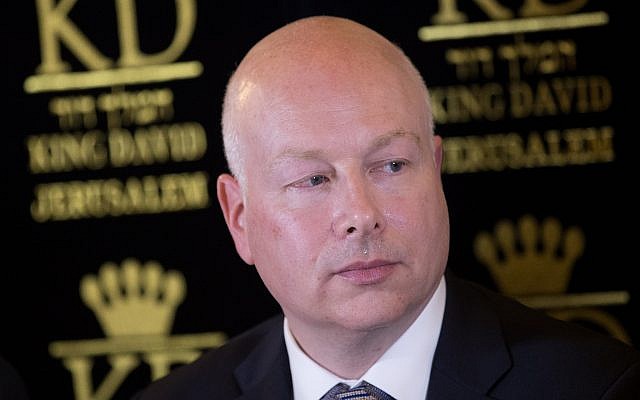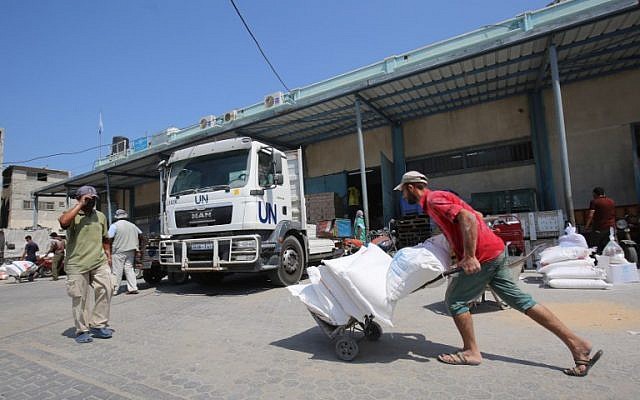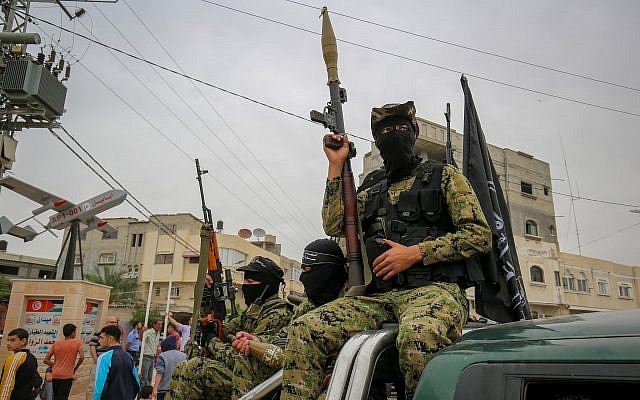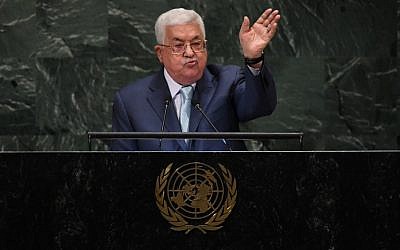Defending aid cuts, Jason Greenblatt cites need for ‘sustainable’ path to peace, says Washington provided support to Palestinians ‘year after year’ while they squandered it

NEW YORK — US peace envoy Jason Greenblatt on Thursday defended the US administration’s drastic funding cuts to the Palestinians, arguing that billions given to this cause over decades have failed to significantly advance the matter.
Rather, he said in a speech to a conference of international donors, it was time to “realistically evaluate what works and what does not,” and to embark on “a new, sustainable path.” While he declined to provide any details of the peace proposal he and other White House officials have been working on for months, he asked members of the international community to study it carefully and be open for new ideas.
“It is time to look at the situation realistically. We could continue the same pattern for years to come, but that would be folly,” Greenblatt told participants of the Ad Hoc Liaison Committee’s annual meeting at the sidelines of the United Nations General Assembly.
“Clearly, none of our financial assistance is getting Israelis and Palestinians closer to a solution.”
The US recently decided to divert all its foreign aid to the Palestinians to other “regional priorities,” a move that has caused alarm among the international community, which has struggled to come up with alternative sources of funding for agencies such as UNRWA, which provides health and educational services to Palestinian refugees.
On Thursday, several countries raised nearly $120 million for UNRWA. The European Union, which together with the US cosponsors the Ad Hoc Liaison Committee, alone pledged an additional 40 million euros for the agency. Over the last three years, the EU and its members states have give 1.2 billion to UNRWA.
“Supporting the agency means supporting peace and security in the Middle East. And this is in our strategic interest,” the union’s foreign policy chief, Federica Mogherini said at a ministerial meeting focused on UNRWA.

Greenblatt, in his speech to the Ad Hoc Liaison Committee, hailed the international community’s “noble effort,” but at the same time implied that money given to UNRWA and other Palestinian causes was wasted if things don’t change dramatically.
For instance, he accused Hamas but also the Palestinian Authority of Mahmoud Abbas of not using other countries’ taxpayers money responsibly.
“We must all ask ourselves why we should keep struggling to raise money when everyone can plainly see the Hamas regime and the PA are squandering the opportunities our money provides for a better future for Palestinians,” he said.
“We cannot continue to provide aid year after year to areas whose leadership, for political purposes, thwarts our efforts to improve the economic well-being of Palestinians.”
Turning to the political dimension of the peace process, Greenblatt dismissed the “the standard talking points about the solutions to this conflict,” noting that they have failed to advance a peace agreement.
“Another hundred resolutions in the UN General Assembly won’t make the lives of Palestinians in Gaza more bearable,” he said.
“Another hundred resolutions will be ignored by Hamas, which continues to hold the missing Israeli soldiers and civilians, who must be returned, and which indiscriminately launches rockets and flaming kites displaying Swastikas into Israel.”

The status quo is “unsustainable for both sides,” Greenblatt said. “We must focus on realistic ways forward. If Palestinian lives are going to be changed for the better, their leaders need to change their behavior. It needs to start with Hamas in Gaza. I will say it clearly: We will not fund a situation that empowers Hamas, an unrepentant terrorist organization. It’s that simple.”
Americans are a generous people and continue to be inclined to provide humanitarian aid, Greenblatt went on. However, the administration “will not reward provocations and violence.”
Since President Donald Trump recognized Jerusalem as Israel’s capital and move the US Embassy there, Palestinian officials have declared Trump unfit to mediate between them and Israel.
“Insults and attacks directed at President Trump and members of the Administration will not help the Palestinian people,” Greenblatt said. “While some may be uncomfortable with our direct, frank message, the United States will continue speaking directly and frankly because we must tell the truth. We do this because we care about the Palestinian people and their future.”
Returning to the issue of financial aid to the Palestinians, Greenblatt said that the administration will no longer pay for “temporary solutions that only prolong the cycle of suffering and violence.”

Many countries are or will soon be unable to contribute large sums for foreign aid, Greenblatt said, citing private conversations with representatives from donor countries.
“We have had enough of the status quo. We have had enough of Hamas diverting funds donated by the generous, well-meaning countries sitting around this table, and using those funds for illicit activity,” he said. “We have had enough of Hamas taking all of our and your generous donations to the Palestinians and then failing to provide even the most basic services – safe water, electricity and hospitals to those who they purport to govern.”
Greenblatt then urged the Ad Hoc Liaison Committee donor countries to join the US in “being direct and frank with the Palestinian Authority about charting a new, sustainable path – one that improves all Palestinian lives.”
The US peace proposal aims at improving the lives of Israelis and Palestinians, he said.
“We are working on a plan that both sides will gain more from than they give; a plan that is realistic, fair, and implementable. Neither side will like everything in the plan, but we are confident both sides will understand why we came to the conclusions that we did — if they are willing to engage.”
PA President Mahmoud Abbas refuses to engage with the US, citing Trump’s alleged bias in favor of Israel.
But, Greenblatt said, “leaders must have the courage to guide their people to a better future.”
It was time to “stop focusing on tired talking points and throwing more money at the same things we have been doing since 1993,” he continued. “It is time to realistically evaluate what works and what does not.”
As reported by The Times of Israel
